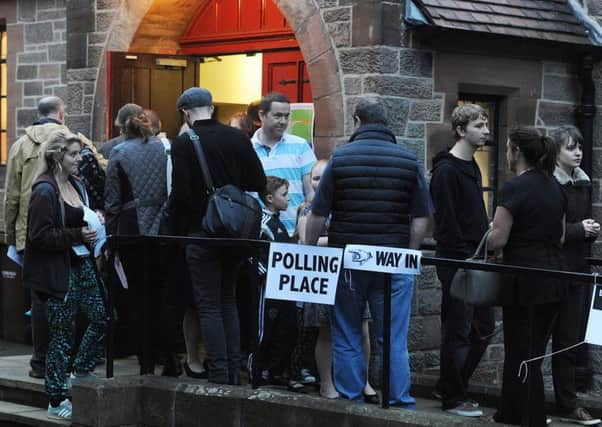Edinburgh to keep Westminster seats, thanks to indyref interest
This article contains affiliate links. We may earn a small commission on items purchased through this article, but that does not affect our editorial judgement.


Interest in the independence referendum led to an increase in the number of people across Scotland registered to vote and means the Capital is now entitled to around 4.5 seats in the Commons, according to quota calculations.
The boundary review has been launched following the UK government’s promise to reduce the size of the House of Commons from 650 to 600 MPs.
Advertisement
Hide AdAdvertisement
Hide AdDOWNLOAD THE EDINBURGH EVENING NEWS APP ON ITUNES OR GOOGLE PLAY
Previous plans for boundary changes by the last UK coalition administration in 2013 after the Liberal Democrats vetoed them.
But the proposals drawn up then would have meant Edinburgh losing one of its five Westminster constituencies.
The four new seats – which were to have been called Edinburgh South-East, Edinburgh West, Edinburgh South-West and Edinburgh Central & Leith – would have been among the biggest in the UK, all with more than 80,000 residents.
Advertisement
Hide AdAdvertisement
Hide AdBut under strict rules to try to achieve seats of equal size throughout the country, the new review sets a target size of 74,769 voters per seat and a maximum limit of 78,507.
The commission tries to avoid creating constituencies which cross local authority boundaries, but Edinburgh East has in the past been linked to Musselburgh.
However, one politician said: “With the figures as they are, it makes sense to leave Edinburgh as it is with five seats.”
The overall UK electorate, as counted in December, has fallen since 2010, the figures used for the previous review – mainly due to the change in the system for registration, which requires each individual voter to fill in a form rather than one person registering the whole household.
Advertisement
Hide AdAdvertisement
Hide AdBut the effect in Scotland has been lessened by the surge of people registering in 2014 to take part in the referendum.
The previous review would have seen Scotland cut from 59 to 52 MPs, but now it will be 53.
England will be cut from 533 to 501, Wales from 40 to 29 and Northern Ireland from 18 to 17.
Edinburgh South Labour MP Ian Murray said: “On the face of it, it looks as if Edinburgh will retain five seats. But I’m hugely concerned about the impact which Individual Elector Registration has had.”
Advertisement
Hide AdAdvertisement
Hide AdThe Boundary Commission for Scotland, which is conducting the review, is expected to come up with proposals by the autumn of this year.
These will then be put out for consultation and there are likely to be public hearings to hear objections from political parties and others.
The commission can amend its proposals before publishing a revised plan, followed by a further consultation period.
A final scheme must be produced by October 2018 in time to take effect at the next Westminster elections in 2020.
Advertisement
Hide AdAdvertisement
Hide AdLord Matthews, deputy chair of the commission, said: “The rules within which we work put great emphasis on equal electorates across the UK, and as a result the review is likely to result in significant change for many constituencies in Scotland.
“Consultation remains a key part of the review process and we will fully consult upon our proposals in due course so people across Scotland can feed in their views”.